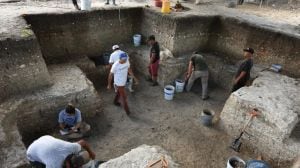Will to divide plagues Singur Act
West Bengal proposes to return land only to farmers who surrendered it unwillingly.
The Singur Land Rehabilitation and Development Act,2011,has opened a Pandoras box and the prospect of returning to farmers has become more and more complicated. This is because the West Bengal government has sought to make a distinction between the willing farmers,who accepted the compensation for land acquired from them,and the unwilling farmers who are the sole beneficiaries targeted under the new Act.
Now,a large number of the willing farmers want their land back in return for the money they had accepted as compensation from the West Bengal Industrial Development Corporation (WBIDC). They have decided to challenge the new Act as they felt that they are being discriminated against.
Tata Motors has already gone to court against the new Act. Waiting in queue are Tata Motors vendors.
There is a distinction within the unwilling group too. The government has decided to return only 400 acres,outside the main Tata Motors factory area of 645 acres. Among unwilling farmers,some lost their land within the factory area and wont get it back. The government wants to keep this land for future industry and will instead have to hand over alternative land. Farmers who lost prime land,therefore,might be offered plots of inferior quality.
On Thursday,moving an appeal before Calcutta High Court judge Saumitra Pal,former Kolkata mayor Bikash Bhattacharjee,one of the Lefts legal faces,said a number of farmers have urged him to appraise the court to include them as an additional party to the Tata Motors case as they felt that under no circumstances could farmers be divided between willing and unwilling. The Land Acquisition Act of 1894,under which land was acquired in Singur,has no provision for making such a distinction,said Bhattacharjee,who plans to move a formal petition soon.
In fact,soon after the Singur Land Rehabilitation and Development Bill was placed in the West Assembly,and well before it was enacted with the consent of the Governor,several legal experts in the High Court had questioned how the distinction could be made. Land for the Tata Motors small car factory was acquired under the Land Acquisition Act,which for all practical purposes is forcible acquisition justified by its use for a public purpose. The question of consent or willing and unwilling would have been relevant only in relation to the compensation money settled or offered,said Arunava Ghosh of the High Court.
Even those who had accepted the compensation might have done so under compulsion or duress. Now their claim that land should be returned gains strength on the ground that the industry that was proposed has been abandoned; the public purpose that it would bring development is lost. Farmers willing to return their compensation money,too,should be given back their land, said Narendra Nath Pakhira of Singur.
Abdur Rezzak Mollah,Land Reforms Minister when the Left Front was in power,and one of the vocal advocates for return of land,pointed out that the Tatas have already made it clear that they will not set up any industry in Singur. With the future uncertain for those who had taken compensation in the hope that industrialisation would benefit their lives,the demand that land be returned to all is legitimate,he said.
Among the issues highlighted by legal experts,one is the use of separate Acts for the acquisition and the proposed return. They say the Singur Act seems to be overriding many Acts,such as the Right to Property Act and the Contract Act in relation to the unilateral termination of the lease agreement.
Surya Kanta Mishra,Leader of the Opposition,felt the government could have amended the 1894 Act rather than introduced the new one,which he called inconsistent and possibly ultra vires if challenged in the Supreme Court. He cited the example of Tamil Nadu where the government undertook an exercise of returning land with a 1996-97 amendment to the 1894 Act.
Beyond the finer legal points,the land return effort has sparked a series of similar agitations elsewhere. In Rajarhat,the government was forced to scale down its land acquisition plans,while protests have erupted in Siliguri and Burdwan too.
GROUPS & SUB-GROUPS
The unwilling
Those who refused to accept compensation for their land. The new Act says they will get their land back if they surrender the compensation money. Photo shows some of them celebrating with Mamata Banerjee.
The willing
They accepted the money hoping industry would change their lives. The factory never came up but they are not entitled to the land that is being returned. Narendra Nath Pakhira (above) and others find the distinction unfair.
The uncertain
Among the unwilling are the Samanta family (above) and many others whose land is now part of the main factory site. They will have to settle for alternative land as the government has kept the factory area out of bounds.






- 01
- 02
- 03
- 04
- 05

























